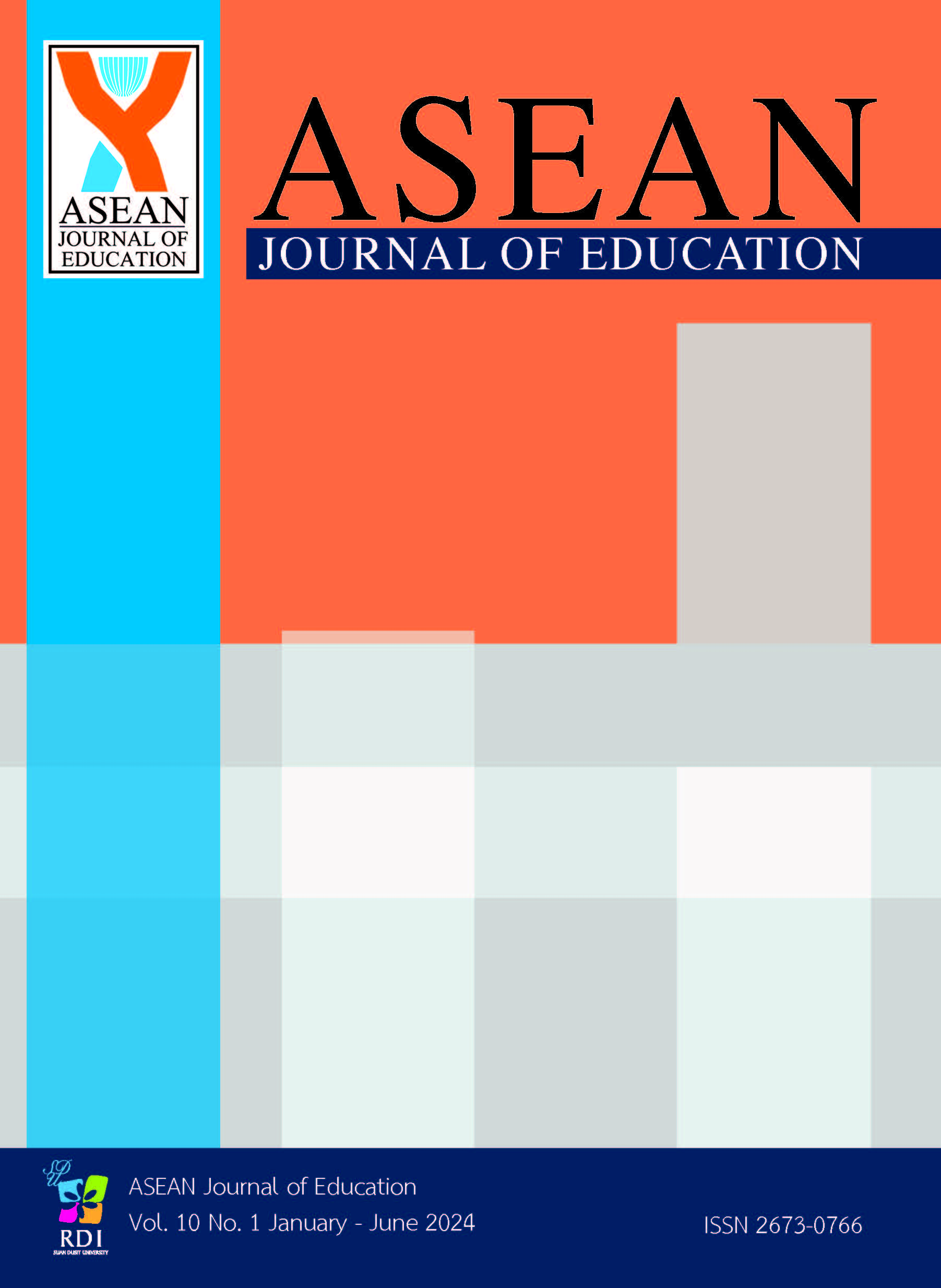The Study of Cognitive and Employability Diagnosis Factors for Supporting Role-Play Learning with Workshop Teaching Model in the Employability Diagnosis System
Keywords:
Social cognitive career factors, Employability diagnostic concept, Employability skillsAbstract
This study was a part of the ongoing research project developing a role-play learning with workshop teaching model using an Employability Diagnostic System to improve the employability of Chinese college students. Employment ability is a social issue that China currently attaches great importance to and a problem that local government departments and universities attach great importance. According to the survey results, students are presently aware of employment ability diagnosis. This research proposes two objectives: 1) To synthesis the factors of Social Cognitive and Employability Diagnosis. 2) To study the correlation of the Social Cognitive factors and Employability Diagnosis. This study used quantitative research methods to explore the impact of various factors in Social Cognitive Career development theory on students' Employability Diagnosis to support the onstruction of role-play learning and workshop teaching model based on Employability Diagnosis System. The study included a sample of a hundred students selected by using Simple Random Sampling and Purposive Sampling methods. The research instruments was a survey questionnaire. The results indicated that the Social Cognitive Career theory included five factors 1) Personal variable 2) Environmental variable 3) Learning experience 4) Human capital 5) Goal identification. The diagnosis of Employability had five aspects: 1) Job search motivation, 2) Job opportunity exploration, 3) Job performance, 4) Job search efficacy and 5) Monitoring and regulation. Furthermore, it was found that the five factors of Social Cognitive Career theory can have a positive correlation on the five aspects of students' Employability Diagnose is in every aspect, with a significant >.05, indicating that Social Cognitive and Employability Diagnosis factors could support and promote the development of role-play learning with workshop teaching model based on Employability Diagnosis System to enhance students' employability skills.
References
Cao, D., & Yi, Y. (2020). Precision employment in the postepidemic era: From accurate information to accurate ability. Employment Guidance, 19, 55-59.
Chadha, D., & Toner, J. (2017). Focusing in on employability: Using content analysis to explore the employability discourse in UK and USA universities. International Journal of Educational Technology in Higher Education, 14, 33.
Chen, L. H. (2019). Diagnosis and exploration of employment ability of normal university students based on the "Employment Ability Development Plan." Practical Exploration, 32(11), 31-34.
Chen, L. H. (2023). Construction of an AHP based evaluation model for the employment ability of normal university students. Research and Practice of Innovation and Entrepreneurship Theory, 2023(19), 184-187.
Chen, L. X. (2023). Analysis of the Causes and Countermeasures for the "Slow Employment" of Generation Z College Students: Taking J University in Shandong Province as an Example. Journal of Northwest Adult Education College, 2023(5), 74-80.
Cheng, S. (2023). Analysis of the connotation factors of college students' employability-Taking China University of Mining and Technology as an example. Research and Practice on Innovation and Entrepreneurship Theory, 17, 63-65.
Forson, J. A., Ofosu-Dwamena, E., Opoku, R. A., & Adjavon, S. E. (2021). Employee motivation and job performance: a study of basic school teachers in Ghana. Future Business Journal, 7(1), 1-12.
Guo, H. (2021a). Research on the path to enhancing the employment ability of college students under the background of smart education. Employment Guidance, 20, 44-47.
Guo, M. (2021b). Analysis on the ways to improve the employment quality of the "Slow Employment" group of college students in the post-epidemic era. Journal of Fujian Normal University of Technology, 39(6), 636-641.
Guo, S., & Wu, Y. (2022). Teachers in the era of artificial intelligence from the perspective of social role theory: Dilemma, attribution, and clarification Research on Electronic Education, 2022(6), 18-24.
Huang, R., & Wei, J. (2019). Research on the path to enhance the employment ability of college students in the era of all media. Employment Guidance, 19, 53-58.
Jing, L., Ma, H., Wang, H., & M., C. (2022). Construction and empirical study of evaluation model for employment ability of college graduates. Journal of North China University of Technology (Social Sciences Edition), 22(4), 108-116.
Liu, M., & Wang, X. (2022). Research on the Employment Competitiveness and Influencing Factors of Finance and Economics College Students in the Post Epidemic Era-Analysis Based on Multiple Logistic Regression Models. Journal of Anhui Agricultural University (Social Sciences Edition), 31(3),113-119.
Liu, Y. (2021). A study on the employability and influencing factors of local undergraduate college students- Analysis based on the 2018 CCSS survey data of N universities. Higher Science Education, 5, 66-73.
Xu, X., & Wang, Y. (2023). Research on the factors influencing the employment ability of college students and the improvement path from the perspective of psychological capital. Employment and Security, (9), 91-93.
Zheng, L., Zhang, H., & Ban, N. (2023). Research on the employment assistance model for graduates of key groups in universities based on employability diagnosis. Educational Observation, 10(12), 65-68.
Downloads
Published
How to Cite
Issue
Section
License

This work is licensed under a Creative Commons Attribution-NonCommercial-NoDerivatives 4.0 International License.
1 All articles will undergo a formal peer-review. A panel of experts from within or without the university will examine the article; approval from a minimum of two experts is required for publication. Revisions posed by the experts must be completed by the research prior to publication.
2 Once published in the ASEAN Journal of Education, the article becomes intellectual property of Suan Dusit University. Duplication, in full or part, requires permission from Suan Dusit University.
3 Excluding errors incurred during printing, author(s) are responsible for the content of their articles.






